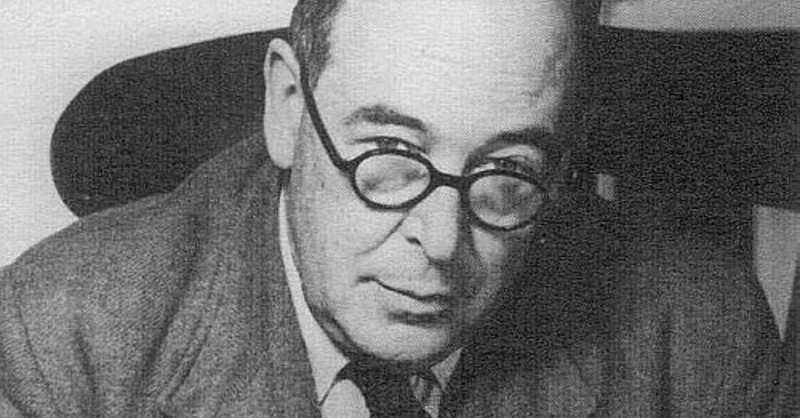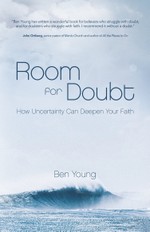Even C.S. Lewis Doubted
- Ben Young benyoung.org
- Updated Sep 04, 2017

If I had to list the most influential Christians in the past 50 years, C. S. Lewis would certainly be at the top of my list. His contributions to the faith rival that of Billy Graham and Mother Teresa.
Lewis maintained a great balance of a heart-felt and intellectually grounded Christian faith. He was a prolific writer, whose books influenced both modern and postmodern readers with vivid imagination and cleverly phrased arguments. The best estimates are that of his fifty plus books, more than 200 million copies have been sold,1 many of his works being turned into movies that have grossed over 1.5 billion dollars around the world.2 His titles include The Chronicles of Narnia, The Great Divorce, Mere Christianity, andMiracles.
But it doesn’t matter how deep or sound your faith in God is. Your world can be rocked by cancer, by death, by suicide. For Lewis, the pain of grief cut so deeply that he doubted the goodness and fairness of God.
He had already published a book on pain and suffering entitled, The Problem of Pain, which was a rational theodicy, but A Grief Observed was raw and personal. Throughout this brief book, Lewis cried out to a God who seemed silent.
Meanwhile, where is God? This is one of the most disquieting symptoms. When you are happy, so happy that you have no sense of needing Him, so happy that you are tempted to feel His claims upon you as an interruption, if you remember yourself and turn to Him with gratitude and praise, you will be—or so it feels—welcomed with open arms. But go to Him when your need is desperate, when all other help is vain, and what do you find? A door slammed in your face, and a sound of bolting and double bolting on the inside. After that, silence. You may as well turn away. The longer you wait, the more emphatic the silence will become. There are no lights in the windows.3
Lewis questioned the goodness of God because He allowed his precious wife, Joy, to go through intense pain and suffering as she struggled with cancer. He wrote,
Not that I am (I think) in much danger of ceasing to believe in God. The real danger is of coming to believe such dreadful things about Him. The conclusion I dread is not “So there’s no God after all,” but “So this is what God’s really like. Deceive yourself no longer.”4
His complaint is similar to Job’s when he questioned God’s justice and allowance of such senseless pain and agony. As he tossed and turned in his grief, Lewis questioned whether or not it was rational to believe in a good God or to see him as “the Cosmic Sadist, the spiteful imbecile?”5 In the midst of his heartache, after the death of his wife, Lewis wondered why this event caused him to doubt everything concerning his Christian faith. He wrote:
Feelings, and feelings, and feelings. Let me try thinking instead. From the rational point of view, what new factor has H.’s death introduced into the problem of the universe?6 What grounds has it given me for doubting all that I believe? I knew already that these things, and worse, happened daily. I would have said that I hadtaken them into account. I had been warned—I had warned myself—not to reckon on worldly happiness. We were even promised sufferings. They were part of the programme. We were even told, ‘Blessed are they that mourn,’ and I accepted it. I’ve got nothing that I hadn’t bargained for. Of course it is different when the thing happens to oneself, not to others, and in reality, not in imagination.7
When someone of his intellectual and spiritual stature doubts, it gives me hope. I’m not the only one to ask such questions about the character of God. I’m not the only one to doubt the validity of prayer. I’m not the only one who feels like God has abandoned me in the depths of my greatest need. I’m not the only one. Suffering, pain, and death bring you to the edge of faith, doubt, and unbelief. And that’s okay. It’s interesting that Lewis wrote his book of doubts, A Grief Observed, under a pen name. I wonder why? Maybe he, like many of us doubters, felt shame at the raw honesty of his doubts.
Thankfully, Lewis wrote down his doubts in a journal that became a book. That was one of the ways he dealt with his doubts. I know he had a close group of friends he met with at the pub on a regular basis, who also served as a source of encouragement for him. But it is in A Grief Observed where we find him venting at God for not healing his wife.
I have a gifted therapist I have seen on a regular basis for over a decade. He encouraged me to start journaling my thoughts, my pain, and my doubts years ago. I have made this a regular part of my life. I don’t feel compelled to write in it every day, though during intense times I do. I just get out my laptop and start letting my thoughts flow off the key board. My therapist believes there’s something healing about externalizing your internal world; getting it out of your head and heart and onto a screen or a piece a paper. That’s what Lewis did. If you don’t journal, you might think about starting. Write out what happened in your day. Write out your prayers. Write out your doubts. Write out your beliefs. And some days just write. Don’t worry about punctuation and spelling, let it flow. Be honest. Be brutally honest if you feel like it.
Again, you must dive a little deeper to grasp a more complete picture of C. S. Lewis and other giants of faith in the history of the church. Lewis, like Job and like Martin Luther, shows that struggle, doubt, and raw grief are all a part of a faith journey with the God who is there and at times the God who you may feel is not there. Madeleine L’Engle summarizes the helpfulness of Lewis’ doubt in this way:
I am grateful, too, to Lewis for having the courage to yell, to doubt, to kick at God with angry violence. This is a part of healthy grief not often encouraged. It is helpful indeed that C. S. Lewis, who has been such a successful apologist for Christianity, should have the courage to admit doubt about what he has so superbly proclaimed. It gives us permission to admit our own doubts, our own angers and anguishes, and to know that they are part of the soul’s growth.8
Mother Teresa doubted. Martin Luther doubted. C. S. Lewis doubted. These are not light weights. These are giants of faith worth following. They made their doubt work for them. They integrated doubt into their faith, and their uncertainty about God and the future deepened their faith over time. This encourages me.
Perhaps you’ve spent long enough being hard on yourself for having doubts about God. You may feel like God cannot and will not answer your prayers because of your doubt. I want to give you permission to stop beating yourself up over your doubts. You are normal. It’s okay. You are not alone. If God did not want us to ever doubt, he could have reached down and ripped the book of Psalms right out of the Bible. God is much bigger than our doubts.
It is possible to have great doubt and great faith at the same time. The two are not mutually exclusive. In Mother Teresa, in Luther and in Lewis we see, great men and women of faith can also be great men and women of doubt. In faith, there is room for doubt.
I am glad to know that such a giant of the faith like Martin Luther struggled with doubt. It gives me hope that I am not alone and that doubt can even strengthen my faith.

This article is the third in a three part series on Doubt and Faith:
Part I - Doubting Mother Teresa
Part II - A Man of Great Doubt, Martin Luther
Part III - Even C. S. Lewis Doubted
Notes:
1. M. J. Porter, “Wheaton College to Screen C. S. Lewis Documentary,” Daily Herald, October 20, 2001, www.highbeam.com/doc/1G1-79384514.html.
2. The Chronicles of Narnia,” Box Office Mojo, accessed April 5, 2017, www.boxofficemojo.com/franchises/chart/id=chroniclesofnarnia.htm.
3. C. S. Lewis, A Grief Observed (New York: HarperCollins, 2009), kindle edition, Chapter 2.
4. Lewis, Grief Observed, chap. 3.
5. Lewis, Grief Observed, chap. 22.
6. “H” is how Lewis referred to his wife, Joy Davidman, in the book A Grief Observed, which he originally wrote under the pseudonym N. W. Clerk.
7. Lewis, Grief Observed, chap. 27.
8. Madeleine L’Engle, foreword to Lewis, A Grief Observed.
Image courtesy: Patheos.com
Publication date: September 4, 2017



















